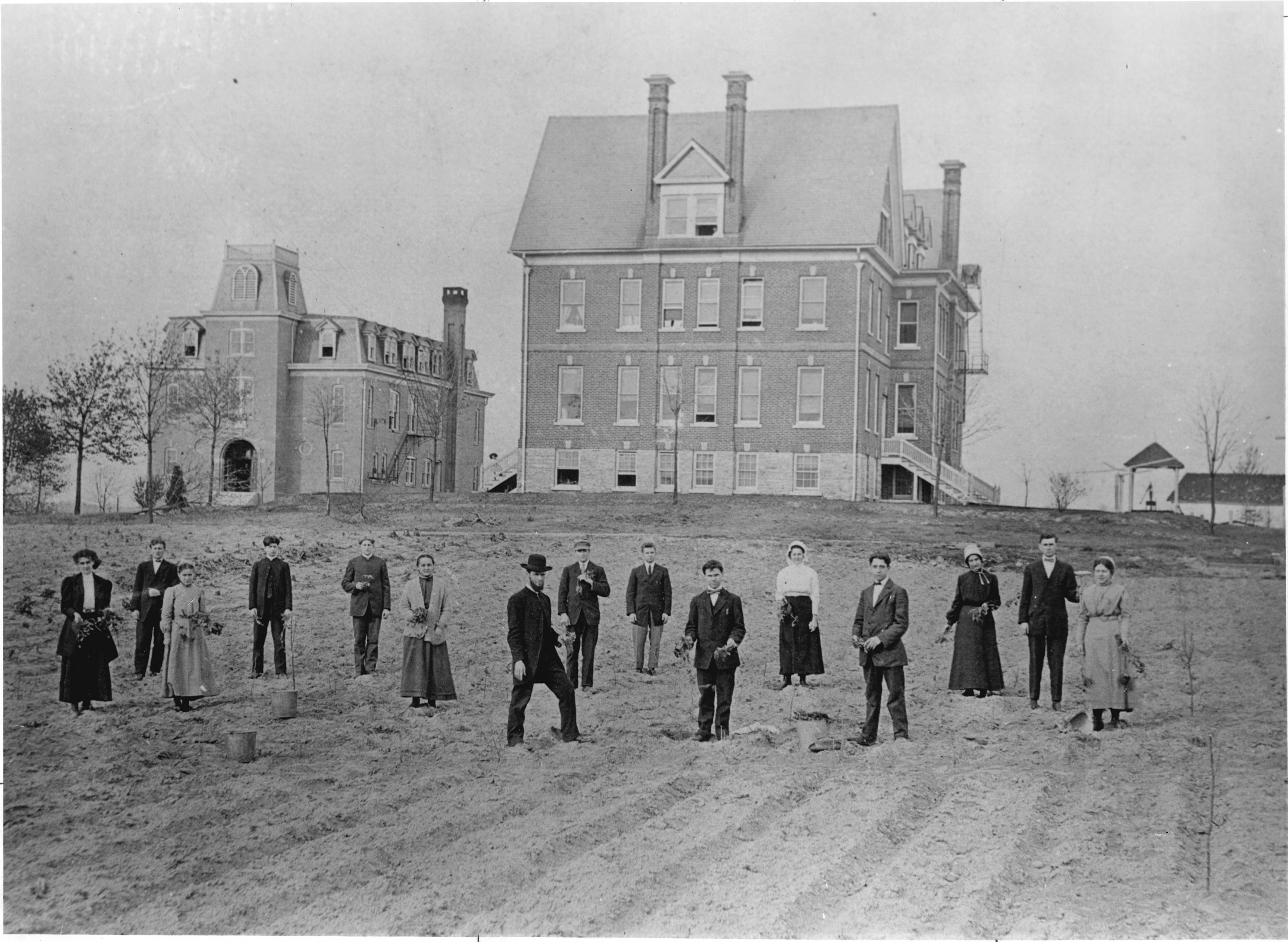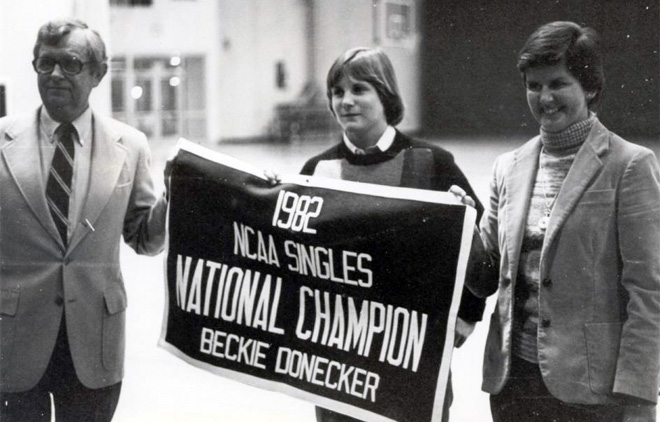Elizabethtown College History
A Brief History of Elizabethtown College
Founded in 1899 by members of the Church of the Brethren, Elizabethtown College was established to provide higher education in eastern Pennsylvania, emphasizing intellectual growth, moral character, and service. This philosophy was encapsulated in the College's early aim: "To live completely, to render the highest service."
Over 125 years later, our campus, our ideas, and our world have changed, but the essence of our mission remains the same. Today, Elizabethtown College offers a transformative educational experience that cultivates personal strengths, fosters a passion for lifelong learning, and prepares students for purposeful work. At the heart of this mission is our enduring commitment to values such as peace, non-violence, human dignity, and social justice.

Presidential History
The legacy of past Presidents of Elizabethtown College is integral to the institution's journey, marking significant strides in shaping the vibrant and outstanding community we cherish today.
- Isaac Newton Harvey Beahm - 1900 to 1902 & 1904 to 1909
- George Ness Falkenstein - 1901 to 1902
- Daniel Conrad Reber - 1902 to 1904 & 1909 to 1918
- Henry Kulp Ober - 1918 to 1921 & 1924 to 1928
- Jacob Gibble Meyer - 1921 to 1924
- Ralph Weist Schlosser (President Emeritus) - 1928 to 1929 & 1930 to 1941
- Harry Hess Nye - 1929 to 1930
- Charles Abba "A.C." Baugher (President Emeritus) - 1941 to 1961
- Roy Edwin McAuley - 1961 to 1966
- Morley Josiah Mays - 1966 to 1977
- Mark Chester Ebersole (President Emeritus) - 1977 to 1985
- Gerhard Ernst Spiegler (President Emeritus) - 1985 to 1996
- Theodore E. Long (President Emeritus) - 1996 to 2011
- Carl J. Strikwerda (Professor Emeritus of History) - 2011 to 2019
- Cecilia M. McCormick - 2019 to 2021
- Elizabeth A. Rider - 2021 to Present
Athletics History
Official recognition of intercollegiate athletics at Etown came in 1928 with the hiring of Ira R. Herr as the school's first coach and athletic director. One of the things that made our College unique was its support of women's intercollegiate athletics alongside men's athletics right from the start. Herr eventually would establish the Blue Jay as the official mascot due to its possession of the school colors and its reputation as fighting, scrappy bird.
As the 1940s began, Etown's development in sports continued but was quickly stunted following the entry of the United States into World War II in December 1941. The varsity athletics program at Etown continued to grow in the 1950s. Also, a watershed event for athletics occurred in 1954 when the College joined the NCAA. The 1960s opened with a bang for Etown athletics, as the men's soccer team captured the first national championship in College history in the fall of 1960. The 1990s began with the College possessing one of the most consistently successful athletic programs in NCAA Division III, a feature that has continued to distinguish the College today.
Although the 21st century is still very young, it has been packed with standout Blue Jay athletic performances as well.

Our Extended History
Church Roots & Early Governance
Founded with support from individual members of the Church of the Brethren, Elizabethtown College became the responsibility of the Eastern (now Atlantic Northeast) and Southern Districts of Pennsylvania. In January 1919, these districts formally assumed control of the College’s operations.
Prior to that, the College’s first official Board of Trustees meeting took place in 1899 at the home of Trustee Nathan Hoffman in Pottstown. Officers were elected, and steps were taken to obtain a charter and design the College seal. By November 13, 1900, the first formal College exercises were held at the Heisey Building in Elizabethtown, and Alpha Hall—Etown’s first campus building—was dedicated in 1901. The College held its first Commencement ceremony in 1903, honoring three graduates.
Over the years, Etown grew steadily—in enrollment, facilities, and academic quality.
Accreditation & Post-War Growth
Elizabethtown College received formal state accreditation in 1921 from the Pennsylvania Department of Public Instruction and regional accreditation in 1948 from the Middle States Association of Colleges and Secondary Schools.
In 1925, students and alumni came together to complete the construction of Lake Placida—named for its serene location—further enriching the campus landscape. The Blue Jay was adopted as the official mascot following a student vote in 1945–46, symbolizing the fighting spirit of the student body.
Following World War II, the College entered a period of rapid expansion. Student enrollment has more than quadrupled, and the academic programs have continually evolved to meet the changing needs of students and society.
Transition to Independent Governance
In 1993, the Church of the Brethren relinquished its official governance role. Since then, Elizabethtown College has been governed by an independent Board of Trustees.
According to the College’s bylaws, five of the 40 board seats are designated for Church of the Brethren members, but these individuals are now elected by the Board, not appointed by the Church.
That same year, the Board of Trustees amended the College’s articles of incorporation to formalize this governance change. In 1994, Etown celebrated a milestone when John H. Leaman II ’95 became the College’s first Rhodes Scholar.
Values in Action: Continuing the Mission
Elizabethtown College’s foundational values of peace, non-violence, social justice, and human dignity, are deeply embedded in campus life. These ideals are carried out through key centers, initiatives, and academic programs that shape the student experience and global perspective.
In 1974, the College introduced two traditions that reflect its vibrant community spirit: The Thank Goodness It’s Spring (TGIS) weekend and Etown’s signature carrot cake, originally served at the Back Door Bakery in Myer Hall. These long-standing traditions continue to connect generations of Blue Jays through shared memories.
Innovation & Momentum in the Modern Era
Elizabethtown College has continued to evolve in the 21st century, embracing innovation while remaining grounded in its values. A major milestone came in 2002, when Brossman Commons was added to connect the Baugher Student Center and the Annenberg Center, creating the vibrant hub of student life that exists today.
In 2007, the College celebrated the completion of the Masters Center for Science, Mathematics, and Engineering, a multi-phased, 83,000-square-foot renovation uniting Musser and Esbenshade Halls. This marked a significant investment in hands-on, interdisciplinary, future-focused education.
Etown has also expanded learning opportunities beyond the traditional classroom. In 2008, the College launched its first Scholarship & Creative Arts Day (SCAD), a signature event celebrating student-faculty collaboration and creativity. In 2010, Etown introduced its first fully online degree, Human Services, through what is now the School of Graduate and Professional Studies, to meet the needs of adult learners and working professionals.
In 2019, the College dedicated the Bowers Center for Sports, Fitness, and Well-Being, a state-of-the-art facility designed to promote holistic health and wellness for the campus community. Named in honor of Kenneth L. ’59, H’99 and Rosalie E. ’58 Bowers, the center reflects Etown’s commitment to supporting the whole student.
In 2022, the College awarded its first doctoral degree, a Post-Professional Occupational Therapy Doctorate (OTD), through its graduate school. This historic moment signaled the College’s ongoing evolution as a leader in advanced, values-centered education.
125 Years of Etown
In 2024–25, Elizabethtown College celebrated its 125th Anniversary, a milestone honoring more than a century of academic excellence, innovation, and community engagement.
